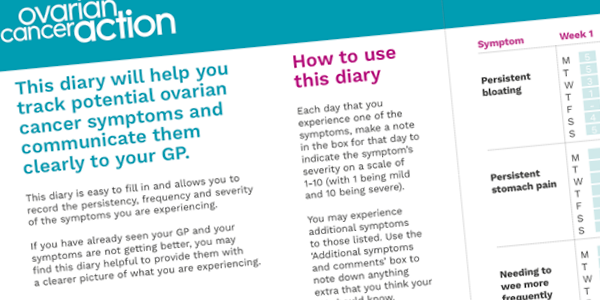Ovarian Cancer Awareness Month
Every two hours, a woman in the UK dies from Ovarian Cancer.
March is Ovarian Cancer Awareness Month, so we wanted to share some facts and figures about the disease and why spotting the symptoms early is so important.
What you need to know
You can read through or jump to specific sections using the buttons below.
About Ovarian Cancer
Ovarian cancer is the 6th most common cancer among women in the UK. There are 7,500 new cases and 4,500 deaths each year.
The death rate is high– only 35% of people diagnosed live for a further ten years. A big reason is that the symptoms make it difficult to detect early. As with most cancers, the earlier it is found, the more effective treatment will be.
Understanding Symptoms
The main symptoms are:
- Persistent bloating
- Persistent stomach pain
- Difficulty eating, feeling full quickly, or heartburn.
- Needing to wee a lot more frequently.
Other common symptoms are back pain, change in bowel habits, unexplained weight loss or extreme tiredness.
Ovarian cancer can go undiagnosed because many symptoms are linked with other, less serious conditions like Irritable Bowel Syndrome (IBS).
The difference is when symptoms are persistent, frequent, severe, and new for you – out of the ordinary to how you usually feel.
If so, you should arrange to see your GP as soon as possible.
Talking to your GP
Preparing for your appointment can help you and your GP.
One way to do this is to keep a symptoms diary to track how often you get the symptoms, how long they last, and how severe they feel on a scale of 1 to 10.

After discussing your symptoms, the first step will be for your Doctor to examine your abdomen for any apparent signs of lumps or masses. They may also perform an internal vaginal examination.
Testing
If your Doctor thinks there is a chance you may have ovarian cancer, the next step is to do a simple blood test. The CA125 test looks at the levels of a protein called CA125 in your blood. Everyone has this protein, but high levels can indicate bowel cancer.
You can often have the blood taken for this test at the practice.
If the test result is normal, it is unlikely you have ovarian cancer. The cause of your symptoms may be other conditions like gallstones or IBS.
Should your CA125 levels be high, your GP can refer you for an ultrasound.
The ‘two-week wait’ policy covers these referrals, so you’ll be seen within a fortnight, normally at the Freemen or RVI.

An ultrasound looks for any unexplained lumps or masses that could be cancer. It’s not a test for cancer.
A referral to Gynaecological Oncology could follow, with surgical procedures to test for cancer or another cause of your issue.
Treatment for ovarian cancer can include surgery to remove lumps or masses, chemotherapy, or radiotherapy.
Risk Factors
Anyone with ovaries can develop ovarian cancer – that’s why knowing and tracking the symptoms is vital, but some factors can increase risk.
The biggest is age. Eighty-four per cent of new diagnoses occur after the age of 50.
A family history of ovarian cancer is also relevant. An inherited mutated gene is present in up to 1 in 5 cases.
Your risk can be higher if you have had a condition called endometriosis. Or if you have had a long menstrual history – starting your periods early, later menopause, or never having given birth or breastfed (both of which reduce ovulation).
Some lifestyle changes can reduce risk, including keeping a healthy weight and not smoking.
Our main message for women this Ovarian Cancer Awareness Month is to know the symptoms and what to do when these symptoms are persistent, frequent, severe, and new for you.
